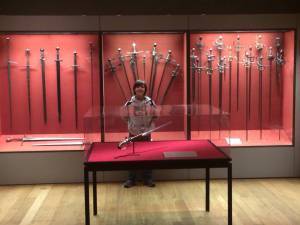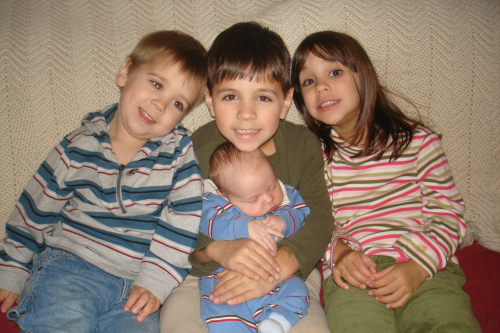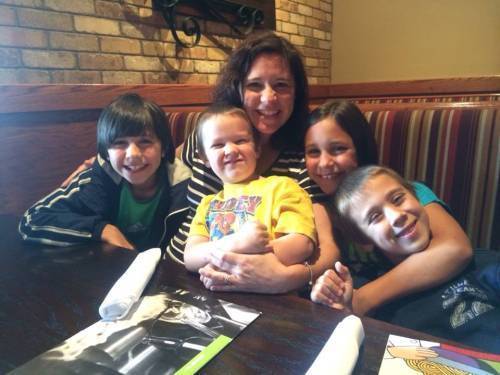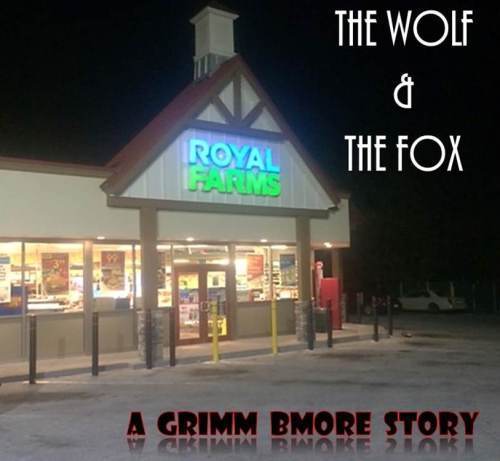Jeff Elkins's Blog
September 1, 2014
I’m Back
Hello You See Kids Readers.
Today I began writing nonfiction again. You can find it at a new site.
http://vagrantmisunderstandings.wordpress.com/
I’ll be putting up at least one nonfiction piece a week. If you want to subscribe to the new site, scroll to the bottom and click “Follow”.
My short fiction will still be posted at shortfictionbreak.com. I usually post there on Sunday nights.
Much love,
Jeff


May 27, 2014
More New Stuff…And Old Things Going Away
On Saturday, I posted about my new job. Today I want to tell you about something else new I’m doing.
 When I first began to take my writing seriously, about a year ago, I had a vision in my head of what it would be like to be an author. I pictured luxurious hours sipping coffee and listening to Sinatra, while gleefully thumping out stories on my lap top. I believed there was no way a short story would take me over an hour – two at most. In my imagination, I never needed to edit anything – ever. I would rip the first draft out of my typewriter and hurl it over my shoulder to the frenzied mob of publishers pushing and shoving one another, fighting to see who could get their fingers on my brilliant ideas first. After savoring the page they would demand more, but I wouldn’t give it. In my dream I would respond in a 1930′s-Cagney-New-York accent, “Now listen here, see. This is just a hobby for me, see. I’ll give you more pages when I have time, see. You need to wait, see.” Then they would weep and cry in despair as I strutted away, offering only reply a confident, maniacal laugh in reply.
When I first began to take my writing seriously, about a year ago, I had a vision in my head of what it would be like to be an author. I pictured luxurious hours sipping coffee and listening to Sinatra, while gleefully thumping out stories on my lap top. I believed there was no way a short story would take me over an hour – two at most. In my imagination, I never needed to edit anything – ever. I would rip the first draft out of my typewriter and hurl it over my shoulder to the frenzied mob of publishers pushing and shoving one another, fighting to see who could get their fingers on my brilliant ideas first. After savoring the page they would demand more, but I wouldn’t give it. In my dream I would respond in a 1930′s-Cagney-New-York accent, “Now listen here, see. This is just a hobby for me, see. I’ll give you more pages when I have time, see. You need to wait, see.” Then they would weep and cry in despair as I strutted away, offering only reply a confident, maniacal laugh in reply.
My dream was not reality.
A good short story takes me a week. I edit everything at least four or five times. Even after all those rewrites, I’m still not satisfied. Rather, I’m exhausted and can’t stand to look at it any more. Any music with lyrics is a complete distraction. I do drink a lot of coffee and often laugh manically, but not because there is a crowd clamoring for my next story.
I’ve been fortunate with this last one, with the crowd part. Before I started writing seriously, I had been blogging for five years. (And yes, there is a huge difference between writing and blogging.) When I finished my first story and prepared to share it, I had already had supportive community (that’s you) around me to give me feed back and encouragement.
Most authors I’ve met over the past year do not have this. They slave away on a story and then have to fight to find a place to share it. Many try to launch blogs with their writing, which is painfully difficult. The web is noisy and increasingly designed to be skimmed. Building a strong readership from scratch is a little like prospecting for gold – you get a nugget here and there, but it drives you to grow a long beard, wear overalls, and scream at strangers through a fog of grumpy-insanity. It is a sad thing to watch: An enthusiastic, young writer slaves over a story. Finally pleased with it she ascends her newly erected digital platform hoping to share her labor of love with the world, but as she begins to speak she realizes there is no one listening.
I want to help. I want to give writers a place to post their stories while they build their own platform. So I’m launching a new blog. It’s called ShortFictionBreak.com. I’ll be accepting submissions from anyone with a story. If you are a budding fiction writer who needs a place to hone your craft, I’ve got space for regular contributors. I’ll give you your own “author page” and when you finally finish your book, I’ll post a link to it as well so readers can find you. I’m doing all of this for free. There is no catch. I honestly just want to help.
Here is how you, faithful “You See Kids…” Readers, can help.
Go over to ShortFictionBreak.com and subscribe so that when authors post their work there is someone there listening. On the right hand side of the page there is a button that says “Follow.” Click that and subscribe.
This week I’m posting a new short story there every day. Today’s is called The Cold Kiss. It’s my first shot at the romance genera. Go check it out…then hit the “Follow” button and subscribe.
My non-fiction muscles are going to focus on the fight against Domestic Minor Sex Trafficking. I’ll be blogging weekly over at Araminta’s website.
With my fiction writing transferring to ShortFictionBreak.com and my non-fiction writing going to Araminta, this space is going away. I’m going to give it another week (and I’ll give you a few more warnings), but by next week “You See Kids…” will be no more.
So if you want to continue to follow my writing, you should go to ShortFictionBreak.com and click the “Follow” button.
Are you getting that I really want you to go and click the “Follow” button and subscribe?
I hope so, ’cause I’m laying it on kind of thick here.
More this week. Thank you for reading my words and entering into my world.


May 24, 2014
NEW JOB! – The Official Blog Announcement
Yesterday it was announced publicly so I’m now free to share here.
I’m starting a new job.

Starting June 1st, I will be the Director of Programs for the Araminta Freedom Initiative. The organization’s mission is to “awaken, equip, and mobilize” the Church and community to end Human Trafficking in the Baltimore area. Specifically they are focused on Domestic Minor Sex Trafficking – boys and girls under the age of 18, from the U.S., who are being sold in the U.S. for sexual purposes.
As the Director of Programs, I will be “responsible for overall program development and implementation.” Right now there are six teams going:
The Aftercare Team – works with survivors or boys/girls coming out of the life.
The Training Team – certifies new Araminta volunteers by holding routine training sessions. Currently there are close to 300 certified volunteers.
The Education Team – provides training on the issue and how to help end Domestic Minor Sex Trafficking for community groups and professionals all over the state.
The Church Engagement Team – empowers churches to join in the mission.
Prayer Team – Suffocates the problem with prayer.
The Systemic Economic Deterrence Team (SED Team for short) – creates economic barriers that will make the trade of children for sex incredibly difficult.
This summer we are also going to be working on a Demand Team that will look to stem demand and a Social Media Team (which has already begun) that will help us get our mission out to the world.
I have a partner. Her name is Kara. She is the Director of Volunteer Operations. She’s in charge of the training, tracking, and managing all the volunteers. She oversees the Aftercare Team and the Training Team. She’s awesome and I’m really excited about working with her. Kara and I work under an amazing Executive Director named Alicia – also awesome, also excited about working with her. The final member of the team is a great Administrative Guru (I’m not sure of her official title). Her name is also Alicia, but it’s pronounced differently, which has already totally thrown me for a loop. I will never keep it straight. Thus I have nicknamed her AC. The team is amazing and I’m honored to be a member of it.
There are two things about the job that intimidate me:
1) For the past two years these teams have been primarily volunteer led. These volunteer leaders have done an amazing job. What they’ve accomplished in two years is beyond impressive – it’s down right spectacular. They are fantastic people. I’m excited to come alongside them. I’m going to do my best not to slow them down.
2) Before hiring me, the Director of Programs spot was filled on a part-time bases by my friend Mark. Like the volunteer leaders, what Mark has done in a part-time role is astounding. I’ve already given up on trying to fill his shoes.
Valley hired me five years ago to help them through a season of transition. My first day on the job I printed off a small sign that read “Finish it by November of 2014.” I hung the sign in a place in my office where only I would notice it. (Of course Chad, the new Head Pastor at Valley, noticed it right away because he notices everything.) Every time I left my office I touched it to remind myself that I had a mission to accomplish.
This weekend I’ve been debating what to put on the new sign. “End It By ???” I believe without a doubt that Araminta is going to bring an end to Domestic Minor Sex Trafficking in the Baltimore area.
Oh, we’re going to end it.
My only question is, how long will it take us?


May 16, 2014
More Updates about Change and Elkins Transition
As I’ve mentioned before on this blog, Wendy and I are in a season of transition. Major components of our lives have been in flux. Thankfully, this wild and crazy time, which began when we ended the Thingy in the Spring of 2013, is finally coming to a close.
That’s right. Things for the Elkins seem to finally be calming down. Here are the big updates…
INCOMING BABY!
Wendy and I found out this week we will be having a boy. That’s right, there will be a fourth Elkins male terrorizing Baltimore this fall. At the ultrasound we learned the baby is healthy and Wendy is healthy, so we are excited.
I’d be lying if I didn’t confess that when we saw the baby there was a small amount of mourning. We were hoping for a girl. “Hoping” my not be a strong enough word. We were “convinced” we were having a girl. Wendy’s been calling the baby “her”. We’ve only picked out girl names. We’ve even been collecting baby girl clothing. We were certain.
Don’t worry, Wendy and I got over the maleness surprise quickly. I think the only one still struggling with the news is Sissy. She really wanted a sister. The following conversation occurred yesterday at breakfast:
Me: How do you feel about getting a fourth brother?
Sissy: Boys fuss to much. Boys are fussy babies.
Me: Oh really. You think this baby will be fussy?
Sissy: Yeah. Jude was fussy.
Me: Jude had colic. He wasn’t fussy because he was a boy.
Sissy: Yes he was. 1 + 3 = annoying.
NEW JOB!
In the fall of 2009 I began working at Valley Baptist Church. The church membership had been in decline for almost two decades when they approached me to join the staff. They knew they needed to change. They asked me to come and help guide them through the coming transformation. Since seasons of intentional change shouldn’t be permanent, I told them I would come and help however I could for five years.
I’m proud of the church Valley has become. God has done beautiful things. The congregation has rediscovered their passion for Jesus and the surrounding community, there is new energy and life in the air, and they membership is growing again. Valley has blossomed into a fantastic family living on mission together. It has been a privileged to watch the Holy Spirit do his thing.
With the season of change at Valley ending, so must my time on Valley’s staff. Wendy and I will still be attending as members. I’ll still be roaming the halls, causing trouble. But I won’t have an office or fancy title any longer (this is an inside joke – no one at Valley was ever completely sure what my title was). Good bye wonderful white boards. Good bye. (Sorry readers who’ve never been to my office – another inside joke. I have two huge white boards mounted on my office walls and another two I like to put on easels. I’m happiest when all four all full of ideas and strategies.)
Good news. I’ve found a new job. It begins June 1st. I’m super excited. The job is an amazing fit for me and the work is meaningful. It is something I am passionate about. Unfortunately, I can’t tell you with who I’ll be working for or what the job is yet. They haven’t publicly announced my coming on board. So until next week you will have to wait with baited breath in frustrated anticipation.
NEW HOUSE?
We moved into our house in Hamilton almost five years ago: the same fall Jude was born, I took the job at Valley, we launch the Thingy, and we helped found City Neighbors Hamilton. It was a wonderful place to live. I miss it.
Knowing my job at Valley was going to end this summer, late in 2013 we left our home in Hamilton, packed all our possessions into a small storage space, and moved in with family. The Elkins Clan has been homeless for over six months now. I’m incredibly grateful to my in-laws for letting us crash in their extra bedrooms. They’ve been amazing.
It appears as though our time without a place of our own is drawing to a close. Thanks to an incredible real estate crew – the Dailey Group – we’ve found a house! This has been a long and drawn out sage which I will share in a blog post later this week. In summary, we’ve been looking for a house since January with no luck. Finally we were introduced to Seth and Alyce Dailey. Their team is amazing and set us on the right track. A few Saturdays ago a house came on the market we liked. The Dailey team had an offer together that evening. It was accepted the next day and we were under contract in less than 48 hours of the house being listed.
It is the perfect place for us. We are excited about moving in and can’t wait for closing to arrive.
MAYBE EVEN A NEW BLOG?
Although this blog has been quiet, I’ve been doing a lot of writing.
The novel is coming along. I’m still editing. I’m way off my deadlines. My original plan was to publish in January. But surprisingly, I’m okay with not meeting my goals. I’ve never written a novel before so what do I know about setting deadlines for completion? Simply put, editing is hard. It’s coming though. Hopefully in another month or two.
Concerning this blog, here is where I am:
I have a feeling I’m going to be writing a lot for my new job. This writing will be entirely non-fiction. I want to give it my complete focus. It will become the priority.
Also, I don’t want things I’ve written in the past in this space to distract from my work with the new organization. (As many of my pastor friends might tell you) some of the stuff I’ve posted here is controversial. Surprisingly it’s not my fiction. What tends to ruffle feathers is my commentary on church systems. Why I enjoy stirring the pot, I don’t know that it will be helpful. I’d hate to go to a work meeting and find someone has googled me, found something I wrote, and wants to debate it.
But at the same time, I want to continue writing fiction. It is a wonderful escape. I love sitting down and hammering out short stories. I’ve enjoyed working on the novel and have several others outlined. I feel like that part of my voice is only beginning to be birthed and I want to explore it further.
So I don’t know. I may take down this site completely (don’t worry – I’ll warn you first)? Or I may leave it up, continue to write here, and just secretly remove some old possibly problematic posts? I’m still thinking through this. I’ll keep you posted.
What I have decided to do is open a new blog space devoted entirely to short stories. I’m working on it now. I hope to launch it in June. It’s going to be called “Short Fiction Break.”
For this site I’m looking for submissions. I’ll share more about this later. For now let me simply put out there – if you like to write short stories and need a place to share them, shoot me an email or put our contact info in the contacts and I’ll be getting in touch.
That is all the updates I’ve got.
Lots happening.
More Elkins updates coming soon.
April 24, 2014
The Wolf and the Fox – A Grimm BMore Story
The following short story is fiction. It is a retelling of a Grimm Fairy Tale. It was selected from a list of Grimm Fairy Tales with a random number generator. You can find the original story by clicking here, but I recommend you read my version first.
Fox froze with fear. Being called out by an adult made his chest pound with anxiety. He wheezed as hot air rattle in his chest. A tear of sweat ran down his nose six-year-old nose.
“Did you hear me kid?” the thin Asian twenty-year-old called from behind the counter. His voice echoed through the empty store. “Can I help you find something? What are you looking for back there?” He wasn’t a large man, but everyone was a giant to Fox, the scrawniest kid in the first grade.
Fox gulped and pushed his glasses back up the bridge of his nose with his right hand. With his left he squeezed the two Hershey bars he was planning to steal. He saw no way past the giant at the counter. He wheezed again and thought some more.
“Kid, what do you need? You okay?” the worker said kindly.
Fox rubbed his short-cut, bright red hair. He looked down at the candy. His teacher Ms. Lisa always said it was best to tell the truth. “Tell the truth above all else,” she said. He could hear her voice in his head repeat the phrase over and over.
Fox swallowed his panic. He knew he couldn’t steal. It wasn’t that he didn’t want to. It simply wasn’t in him.
The six-year-old walked to the register. His eyes barely reached the top of the counter. He placed the two candy bars in front of the man. “I need these,” the Fox said softly.
“That’ll be four-fifty-six,” the worker said punching buttons on the register.
Fox sighed. He thought about what was waiting for him outside if he didn’t come out with the candy. He wanted to cry. Pushing back tears, he clinched his little fists and rallied his courage. “I don’t have any money,” Fox’s voice cracked, “But I need them.”
The Asian man picked up the candy and began to say “no” but something about the boy’s sad eyes gave him pause. If the store were busy, he wouldn’t have given the kid a second glance, but what else did he have to do? “Why do you need them?” he asked suspiciously.
Fox looked at his feet and shoved his hands in his pockets. “I just do,” he said, choking back tears.
“Well,” the kind worker said leaning forward on the counter. “I can’t just give away candy. You’ve got to earn it.” He looked the boy up and down. “Do you have any skills? Anything you can do to earn the candy?”
Fox looked up from his shoes and gave the man a sly grin. He took a step back from the counter. The man smiled, eager to see what the little boy would do to get candy.
With his hands by his sides, Fox focused on the radio playing softly over the store speakers. It was a commercial for a car lot. He waited. His expression was intense. This was serious business. The man didn’t know it, but this wasn’t about candy. Fox was dancing for his life. The commercial ended and a song began. As the first beat hit, Fox stepped forward with his left foot. With the confidence of a lion, he thrust his left hip rhythmically in time with the music, imitating a dance he’d seen an actor do in his grandmother’s favorite disco movie. Next he added a shoulder jerk to the hip thrust. The two motions continued in harmony for a few seconds, then the show really began. Suddenly there was snapping and twirling and jazz hands and power kicks. Through the entire performance Fox maintain locked eye contact with the cashier, willing the man to give him the candy.
The worker was stunned. His mouth hung open, speechless. At the end of the song Fox threw his hands up in victory and looked to the ceiling as a dramatic gesture of completion. The cashier laughed and applauded furiously. “Wow,” he said holding his hands up in surrender. “That was totally worth two candy bars.” He removed his wallet from his back pocket, took out a five dollar bill and put it in the till. Then he passed the candy bars across the counter.
Fox left the store holding the candy bars with both hands. He was proud of himself. Less proud that he’d won the candy with an impromptu dance, more that he hadn’t been forced to steal. He ran down the hill toward the basketball courts where he knew his brother was waiting.
Randy was eight years older than Fox. He was lean and tall, a natural athlete; but his complete lack of discipline and poor temperament had kept him from excelling in organized sports. Unlike most younger brothers, Fox had never looked up to Randy. The older boy was cruel. He punished he ruled his younger sibling with fear and violence. Fox hated Randy and spent most after school hour trying to stay away from him.
Randy was where he always was in the afternoon, shooting baskets and smoking his delinquent friends. Seeing Fox stumbling down the hill, Randy passed the ball to a friend and walked over to meet his younger brother.
Fox slowed when he saw Randy coming. He approached slowly, holding the two candy bars out as a peace offering. Randy stopped at teh base of the hill and waited. When Fox came within arm’s reach, Randy snatched the bars with his left hand. With his right, Randy pressed his palm hard into Fox’s forehead and pushed the younger boy to the ground. Ashes from the lit cigarette Randy held between his fingers fell into Fox’s hair, burning the young boy’s scalp. Fox yelp with pain, brushing his hair with both hands.
“Just two?” Randy said with angry disappointment. He kicked Fox in the ribs. Hard enough to hurt, but not hard enough to do damage. “There’s six of us playing ball. What are we suppose to do with two candy bars?”
Fox said nothing. He straightened his glasses and stared back at his brother with anger. He knew better than to try and stand. He’d learned to wait for Randy to bore before getting up.
“You’re worthless,” Randy said, kicking at Fox again. The younger boy grunted, but refused to cry. Randy laughed at his younger brother’s resolve. He ripped open one of the candy bars and sneered at his brother, “You better bring more than two tomorrow. Or else.” Then he turned and jogged back to his pack.
When the automatic doors slid open, the worker was surprised to see the red-headed kid return the next day. The store was full. A line of five adults were waiting to check out. Most held coffees and plastic wrapped pastries. A few had cold sodas from the refrigerated case in the back. An elderly man with a brown cane stood at the head of the line, debating which lottery numbers to select. Six other customers milled about the aisles, searching for the items they needed. Fox stopped inside the front door and took in the scene.
“No time for a dance today, kid,” the worker called as he punched the elderly man’s lottery ticket numbers into a square read machine. “To many customers. Maybe tomorrow. You’ll have to come back tomorrow.”
Fox grinned in reply. He knew the same trick wouldn’t work twice. He’d come prepared. Fox took off the small superman backpack he was wearing, set it on the floor, unzipped it, and reached inside. From the bag he retrieved a small, empty grape jelly jar and a scrap of cardboard from a pizza box. On the cardboard, scribbled in black marker were the words:
WIL FLEX FOR 50 SENTS
Fox placed the jar on the ground at his feet, then he meticulously leaned the sign against it so the words could be read by everyone in line. Finally he stretched his arms above his head, cracked his knuckles, and rolled his shoulders like a boxer preparing for a fight. Then he let his hands fall to his side and stood still, as straight as a statue. Fox’s face was expressionless and his eyes blankly stared forward.
The adults in line looked at him with curiosity. A portly man in a poorly fitting grey suit, standing third in line, laughed. He fished in his pocket for changed. Pulling out two quarters, the customer leaned forward and dropped his change in the jar at Fox’s feet. Then he took a step back into line to watch what the scrawny kid would do.
Fox didn’t make eye contact with the customer in the suit. Instead, he bent his arms into a horseshoe, gritted his teeth, and flexed every muscle he could for as long as he could. The strain caused the small veins in Fox’s neck to protrude. A growl escaped from his throat. After a few seconds the six-year-old stood up straight again. His face returned to its expressionless, blank stare as if nothing had happened.
The line of customers burst into laughter, shaking their heads. One at a time they each paid. Every time money fell in the jar, Fox struck a different pose. After he had flexed for the ninth customer the kind worker behind the counter called, “Alright, that’s enough. Go get your candy.”
Fox snatched up the jar and ran to the back of the store. He grabbed two Hershey bars and then sprinted to the counter with glee. He couldn’t believe his plan had worked. He put the jar on the counter, said, “Thank you.”
Mustering his courage, Fox stepped toward the door to take the loot to his brother. Fox stepped toward the exit and the automatic doors slide open, but the young boy stopped short. An idea had struck him. He turned around, his eyes gleaming with thought. Fox looked at one of the customers at the coffee bar. The man was pouring creamer into an extra large Styrofoam cup.
Fox walked over to the man and pulled on his pant leg. “Excuse me sir,” Fox said softly. “I need your help.”
Randy again met his brother at the bottom of the hill, but this time Fox didn’t slow. He didn’t want Randy to push him again. He didn’t want his brother’s hands on him. Instead of giving Randy the chance, just before reaching the older boy, Fox slid on his back like a baseball player coming into home. Fox stopped just before colliding with Randy’s legs. From the ground, Fox held up the two candy bars, one in each hand.
Randy was confused. He looked down at his younger brother, not sure what to make of the slide. He took the candy and kicked the boy in the ribs. Fox grunted but smiled with pride at the clever way he’d avoided Randy’s cigarette-ash-shove. “You think you’re cute,” Randy said again kicking the boy a second time. “You’re not cute,” he barked. “You only brought two again.” He kicked his brother a third time, adding more force.
A small yelp escaped Fox’s throat. The young boy was immediately disappointed in himself for showing weakness to Randy. The older brother laughed and kicked him again. “I told you more than two this time,” Randy said. “What are you? Some kind of retard?”
Still laying on the ground, Fox rubbed his left ribs with his right hand. “If you’re so big and smart, go steal them yourself,” Fox replied.
“Yeah right,” Randy laughed shifting his weight to his other foot and kicking Fox on the right side.
“You’re scared,” Fox said softly, fighting back tears. Gaining confidence, he added more firmly, “You’re a scared little baby. You send me to do it because you’re a scared little baby.”
Randy kicked Fox on the right harder. “Shut up,” he yelled.
Fox’s sides ached. He didn’t want to be kicked again, but he knew he couldn’t stop. Instinct told him to press forward, to go through with the plan. “You can’t do it,” Fox mocked the older boy. “You can’t get candy like me ’cause your a scared little baby.”
Randy kicked his brother one more time. The fifth kid was so hard it made Fox choke and then groan in pain. Randy laughed. “I’ll show you how to do it like a man,” he said with confidence.
Randy strutted into the store with no fear. If they’d let his kid brother get away with stealing there was no way they were going to stop him. He paid no attention to the line of customers or the worker behind the counter. Marching down the center aisle Randy grabbed a handful of Modtown Meat Snacks jerky sticks and shoved them into his front pocket. Next, arriving at the candy, he bent down and took the entire box of Hershey bars. With the candy under his arm and the jerky in his pocket, he turned and started back toward the door.
“Hey,” the worker shouted angrily, recognizing what was about to happen. “You need to pay for that.”
Randy didn’t look up. He didn’t make eye contact. With a big grin and his head down, he kept walking. “They didn’t stop Fox,” he assured himself. “They won’t stop me.” He stepped passed the line and toward the door with confidence.
“Hey!” the worker yelled again, this time louder. “You have to pay for those!”
Randy laughed to himself as he reached the exit. He was giddy. “What an idiot,” Randy thought. “Why would you only take two?” The automatic doors slid open in front of him and he stepped into the afternoon sun. His mouth watered as he imagined eating the spoils of his theft.
Randy turned to head back down the hill, but was stopped short. A strong yank from behind on his shirt collar took the thin boy off his feet. His back hit the concrete hard and he yelp. Before he could move, strong hands flipped him onto his stomach, crushing the candy bars under his stomach. Randy was in shock. His mind couldn’t comprehend what was happening. He strained his neck to see the powerful person pinning him to the ground.
The police officer was in all black. He wore black sunglasses. Randy’s fearful eyes were drawn to the the black metallic gun on the officers hip. Randy winced in pain as the officer forced his hands together. A zip tie ripped at the skin of Randy’s wrists and he moaned in pain. He could taste terror induced vomit in the back of his throat. Tears filled his eyes. He sighed and looked forward.
There at the top of the hill, leaning on a parked car was Fox. The six-year-old stood silently, smiling in victory.
———————-
If you want to read more Grimm BMore Stories, check out the links below:
The Skillful Hunter Part Three
More to come…


April 15, 2014
Picking and Choosing – Tough Questions #3
Tough Question #3 – Do Christians pick and choose parts of the Bible they want to follow? If so, aren’t they just creating their own religion and using the Bible to justify what they want to do?
My two friends and I leaned back in the grass on the hill across the street, watching the newly arrived freshman mull around awkwardly in front of their dorm. Most bit their lips with anxiety or stood rocking on their heals with their hands jammed in their pockets. They were to afraid to go back to their rooms and face their new roommates, but also to terrified to explore the campus alone. So there they were, trapped on the front sidewalk, hoping to think up something to do.
We judged them – one by one. We mused about how the thin frail boy with delicate hands and red hair had to be a music major, probably piano. We laughed about how the pock marked faced one with a giant soda in his hand should go ahead and give up on dating now. We were certain the mop haired, thin boy in baggy pants hoping someone would join his game of hacky-sack was a business major. It was a fun game for us superior sophomores. One we’d watched last years sophomores play with us as we stood in front of the dorm a year before.
A new group of faces burst through the front doors of the dorm. There was confidence in their eyes and pride in their stride. They smiled wide and laughed with one another. These were cheaters. They’d known one another in high-school. We disliked them because they were ruining our game. Comfortable community masked the anxieties and eccentricities that fueled our fun. The trio stopped at the bottom of the front steps were a fourth friend joined them. They smacked hands and hugged victoriously, as if there mere presence at the university was cause for celebration.
“Way to go gang,” I sneered, “two points for showing up.” Then I added to my two friends seated on either side of me, “They were probably all on the same small town football team.”
“Nah,” my friend on the left responded. “Baseball. There two small for football.” He was right of course. The boys were lean and muscular, but none of them had the bulk Texas high-school football demanded.
“I think we should pray for them,” my overly-evangelistic friend said from my right with deep sincerity.
“Yeah,” the friend on my left said. “Definitely. You want to lead out?”
“Wait a second,” I said with frustration, but not surprised by my zealous friends. “What are we praying for?’ I asked, knowing their answer. It was what they always wanted to pray for.
“For their salvation,” my friend on the right said with disdain for my hesitancy.
“How do you know their not saved?” I asked for the sake of being antagonistic.
“I can just tell,” my friend on the right said firmly.
“Even if they are, it can’t hurt to pray for them,” my friend on the left said with optimism.
“If you’re so concerned for their salvation,” I said. “Why don’t we get up and go talk to them? Let’s go and share Jesus right now.” I started to stand even though I had no intention of crossing the street to talk to a bunch of strangers.
“It’s not the right time,” my friend on the right said with authority. “But you’re right. We should pray that God gives us a chance to talk to them later. We should ask for a divine appointment.”
“Nope,” I said, now in full combat mode. “If you believe they need salvation we should go and talk to them right now. What if we never see them again? Didn’t you just lead a Bible study last week about not missing an opportunity? You can’t pick and choose,” I accused. “If you think they need to be saved then we should go and do some saving.”
“You’re one to talk. Weren’t you just spouting off last week about the power of prayer and how ‘it’s the most important thing we can do.’” my friend on the right said mocking my voice as he quoted me. “Besides,” he continued comfortably. “I don’t feel like God is calling me to speak to them right now. In my Bible study, if you were paying attention, I also talked about being shrewd and wise. We shouldn’t change in there like fools.”
“Yeah,” my friend on the left said. “We should pray we see them again.”
Defeated I took my place back in the grass and joined my friends in prayer.
Before I jump into my argument, I feel the need to distinguish between picking-and-choosing out of ignorance and picking-and-choosing with intention. These are completely different things. To base my belief system on certain aspects of the Bible because I haven’t read or haven’t understood other parts is natural. We are maturing creators who learn and grow. Ignorance is part of our DNA. It is the foundation of wonder and new beginnings. To selectively follow some aspects of a world view because we have not encountered other ideas should be expected.
This is not what my friends and I were doing in the grass. We’d read Jesus’ teachings on not judging our neighbors. We’d studied his thoughts on loving and serving. We’d discussed at length concepts of evangelism and discipleship. But rather than drawing on our wealth of knowledge we chose to do that which made us comfortable and then return to our well of understanding only to justify our actions.
This is not rare to Christianity. It is the human condition. When given the opportunity, it is our instinct to reinforce existing world views over challenging them. We listen to speakers who affirm our current trajectory. We read books that bolster our established position. We surround ourselves with people who see the world as we do. Not completely, mind you. A little push back is good for the soul. It keep dialog going. Ravens fans love to argue over whether or not Joe Flacco is worth his pay. Ravens fans even enjoy debating a Steelers fan over who is the greatest. But Ravens fans have no interest in debating whether or not Spain will repeat in the 2014 World Cup. We like to stay in our lanes.
Knowing the strong drive for comfort is part of the human condition, rather than spending more time debating rather or not Christians pick-and-choose, let me instead share how I think we should push back on this urge. Acknowledging that there are things about our world view we don’t know, that we are picking-and-choosing out of ignorance, there are three things I believe we must routinely do.
1) Acknowledge that we don’t know everything.
The key to avoiding the intentional picking-and-choosing I and my friends on the hill practiced is to recognize that I am not mature. I must admit to myself that I do not have everything figured out. I must allow myself to take the position of a child, not an adult. In comparison to the speck of knowledge I have gained there is an ocean of perspective I have yet to encounter.
If I reject this posture, and rather convince myself that I know, than there will never be growth. The only seat available to me is the judges bench. I cannot hear or see new things from such a lofty position. I can only bang my gavel and announce over and over, nauseating everyone around me, my limited perspectives on life.
The dark void of my ignorance is terrifying to peer into. While turning my back on the cliff before me and refusing to acknowledge its existence might be comforting, it is not helpful.
2) Study, study, study.
The responsibility for pushing my understanding of the world past the current boarders defined by my ignorance is on me. It is my job to discover what I don’t know. No one else can be held accountable for pushing me out of my comfort zone. Thus I must discipline myself to study new things. Never fear, this does not mandate hours in a library. It does not necessarily require evening after evening reading vast tomes by candle light. We learn in different ways – some of us grow through conversation, others through experiences, others are visual learners who need pictures as guides. I’ve found the key to living in a mode of study that expands my world view is to be awake. To study the world is to be alert to what is happening around me. If I’m sleeping through conversations with people, lulled into a slumber by my narcissism, then I will learn nothing from those around me. If we hope to grow than we must be in a constant mode of learning. Such learning demands we are actively engaging in life around us.
3) Lean into things we don’t understand.
I can read the Gospels over and over. I love the stories. I get lost in Jesus’ interactions with the other characters. I enjoy imaging the scenes, trying to place myself inside of them, dreaming about what each character must have been feeling. The Letter to the Romans on the other hand, I’m not a fan. It’s complicated and wordy and weighed down with scholarly voices I don’t enjoy. It is difficult for me to read. It stabs into my comfort zone like a knife into a balloon, so I delve into it again and again. I’ve spent more time in it than any other of the sixty-six books in the Bible because it makes me uncomfortable.
Recently I was working through 1st Corinthians, a book I love. The letter is a like a warm blanket. My soul is eased when I wrap myself in it. But then I noticed a verse I hadn’t seen before. In chapter 15 Paul says, “The sting of death is sin and the power of sin is the law.” The verse is confusing to me (for reasons I won’t go into now). It made me uncomfortable. My first reaction was to move on and not think of it any more. Fighting against that urge, I typed it up, printed it off, and stuck it on my wall.
This of course goes beyond Bible passages. It applies to every bit of knowledge we encounter. As we live an alert life of study, when we find something pushing against our understanding of the world we must deny our natural urges to run from it, and instead lean into it seeking to understand why it is pressing against us.
Conclusion:
Do we, Christians, pick and choose what we follow and what we don’t?
No more than any other human. Ideally only in ignorance and not out of intention, but I know I have been guilty of the latter.
To avoid the temptation of the judges seat, it is not simply enough to acknowledge the chasm of our unknowing. We must dive head first into it. Remaining tethered to our foundation, we must stab into our comfort zone with new ideas and challenging thoughts.
This is part of a larger series. You can read the introduction here. And parts one and two here and here and here. Next week I’ll attempt Question #4 – How are we to understand Biblical violence in union with a loving God?


April 7, 2014
Updates! Updates! Lots of Updates!
Okay. You can breath now. I know many of you have been holding your breath since my last blog post. It’s been three weeks. You are now allowed to suck in some fresh air.
It’s been three weeks, people!
THREE WEEKS!
I’m a little ashamed - Three weeks since I last posted. That’s that longest stretch without a post since Wendy and I started the blog over five years ago.
Allow me explain my digital absence.
Life has been a little crazy for the Elkins’ clan. Here are a few of the fantastic highlights from the month of March:
Jackson and Logan both finished their indoor soccer seasons. Wendy coached Jackson’s team. I’m proud of both boys. They did great and had fun. The amount they improved over the season was impressive.

Logan playing goalie.

Wendy coaching Jackson’s team.
Wendy and I both came down with the stomach flu at the beginning of the month. We went out of commission for a week. Then there was a week of recovery. The kids came through mostly unscathed. Julianna had a little bout, but nothing like the total destruction Wendy and I faced.
When the flu lifted, Julianna had a fantastic birthday party.

Julianna and a friend at her birthday party.
I had the privilege of working on and helping present Araminta’s first youth focused conferene on Domestic Minor Sex Trafficking. There was a Friday night parent presentation and then an all day Saturday conference. It was a wonderful experience.
Valley (the church I work for) hired a new Head Pastor. He started in late February. He’s amazing to work with. I love being on a team with him. We’ve connected well. At the same time, my tenure at Valley is coming to an end (most of my regular readers know, I took the job with a term limit because I was hired to help the church through a season of transition). I’m currently passing off or bringing to a close my responsibilities.
Then there is The Jude.

The Jude
Yep. Jude.
Wendy and I have been doing a lot of house hunting. It’s been exhausting and discouraging. I don’t understand the market and feel like everything is wildly overpriced. Thankfully at the end of this month we fell in with an amazing team named The Dailey Group. They are helping us find a great place to live.
Jackson had some art work posted at the Hamilton Art Gallery. That was cool.

Jackson standing next to his art work. His is the one on the top.
Jackson and I also took a day trip to the Philadelphia Museum of Art. It was part of a Hopkins program. We got to hang out with an expert in Medieval armor who taught us all kinds of amazing stuff. Then we spent the rest of the day walking around Philly together. It was a wonderful day.

Jackson in front of swords at the Philadelphia Museum of Art
Finally, concerning my writing…
I had hoped to be completely finished with my first novel in February so I could publish in March. As you can see above, there has been a lot going on. My progress has slowed and timelines have been pushed back. I’m almost done with my final edit (I’m shooting for the end of this week). Then the book goes to an editor. After that we will see. I’ll keep you posted.
Okay, a few more thoughts.
I don’t want you to think my slow down is a lack of enthusiasm for the project. I’m excited about it. When I first began writing it, I didn’t really know what I was doing. I had a bunch of stories in my head I wanted to tell, but I wasn’t sure how they all connected. Since January I’ve been refining. I now know what the book is. It’s a coming of age story about a young pastor and his wife awakening to what it means to serve people in the inner city during the Post-Christendom transition.
Soon I’ll begin posting dates and portions of it. I’ll be looking for readers to post reviews in exchange for free copies. I’ll be running possible titles by you. All that good stuff.
Look for it in a month or two.
I’ll keep you informed.
So for the blog? Will it be another three weeks before my next post?
I think now that I’m through March I’ll be able to start blogging more. I’m going to pick back up the two series I abandoned at the first of the month: Tough Questions and Grimm B-More Stories. I’m hoping to get back into my two posts a week rhythm.
We shall see.
I make no promises and reserve the right to change my mind at any moment.
Consider yourself Elkins Updated.


March 13, 2014
A Little More About Domestic Minor Sex Trafficking
 Last week I posted a survey launched by Araminta’s Strategic Economic Deterrence Team. Many of you after reading the post sent me messages like, “I filled out the survey but I really don’t know anything about Domestic Minor Sex Trafficking.”
Last week I posted a survey launched by Araminta’s Strategic Economic Deterrence Team. Many of you after reading the post sent me messages like, “I filled out the survey but I really don’t know anything about Domestic Minor Sex Trafficking.”
Until recently, I was with you.
In 2013 I was made aware. Araminta’s volunteer training opened my eyes to an evil, underground industry I didn’t know existed in our city. (If you are interested in learning more and having your eyes opened as mine were then keep an eye on the Araminta website. They should have another one coming up soon. I highly recommend the training. You will leave changed.)
When my friend Mark (the Director of Programs for Araminta) first explained Domestic Minor Sex Trafficking to me almost a year ago (I interviewed him for The City that Breeds last May) I wanted to push back on the facts he was sharing; not because they were unbelievable, but because I desperately didn’t want them to be real. I didn’t want to believe that kind of heinous behavior was happening in our city.
But it is real and it is happening.
And if you are not informed, it’s time you become informed.
I don’t know what other term to use to explain Domestic Minor Sex Trafficking to you besides “evil.” To take a child and sell her to another person for sex is an act of evil. To buy a child for sex is an act of evil. There is no excuse for it. There is no justification. It is evil.
Tonight I’m going to provide you with some reading material.
Click here to read my interview with Mark from May of 2013. Mark breaks it all down with beautiful, unapologetic simplicity.
A few quick warnings so you are not surprised… At the City that Breeds I write as “The Bishop.” The blog is a snarky, secular, humor blog. Most of the posts are about drinking, hanging out, and being single in Baltimore. It is full of profanity. If such topics or language offend you, don’t go clicking around to other articles. To understand why I write there in the voice that I do, go and read 1st Corinthians 9.
Here are a few great quotes from the interview to get you interested:
“Human trafficking is the commercial exploitation of human beings for fiscal gain. It can be broken into two forms: Labor Trafficking or Sex Trafficking. Sex Trafficking is forcing someone to perform sexual acts through violence, fraud, manipulation, or fear for profit. Most sex trafficking is child trafficking, meaning the victims are under the age of 18. The average age of a sex-trafficking victim is around twelve years old. The legal definition of domestic minor sex trafficking is the “recruitment, harboring, transportation, provision, or obtaining of a person for the purpose of a commercial sex act” where the person is a U.S. citizen or lawful permanent resident under the age of 18 years.”
“There are also huge misconceptions in our culture regarding prostitution. For example, there is no such thing as a “teen prostitute.” The term “prostitute” frees us from guilt and makes the situation more palatable. When we hear in the media that someone in power like an athlete or a politician was caught with an under-age prostitute, the word “prostitute” makes us think the girl had some choice in the matter. It is a myth. An under-age prostitute is a sex slave.”
“We also completely misunderstand the word “pimp”. For many, when they hear the word “pimp” the image in our mind is of an African-American male, dressed loudly, with lots of bling. A pimp is a sex-trafficker. Sex traffickers come in all shapes and sizes. They are all races. They are male and female. There have been sex traffickers as old as seventy arrested in Baltimore. In a recent bust a police officer in his thirties was selling his nineteen-year-old wife. We have begun using the word “pimp” to mean “to beautify something”. For example, we want MTV to come and “pimp” our ride. Pimps are sex-traffickers. To use the word in such a way glorifies modern slavery.”
Go now and read. Get informed. Open your eyes. Wake up.
Then come to an Araminta training, become a certified volunteer, and join the fight by jumping onto one of their many fantastic volunteer teams.
If you didn’t take the Strategic Economic Deterrent Team survey on hotel use yet, do that by clicking here.
Thank you!


March 11, 2014
Contradictions within the Bible – Tough Questions #2 Part B
I published the first half of this essay last week. I meant to publish Part B the next day, but I got lost in work and life. Soooo here it is now. But it won’t make any sense without Part A. If you haven’t read Part A, click here to read it first.
Cross-Text Contradictions
Cross-Text Contradictions are more difficult for me to sort out.
The concept of “intentional discrepancy” I used in Inner-Textual Contradictions is excluded here. To say two authors of separate books colluded together to create intentional contradictions across books means those authors:
Believed their books would continued to be studied centuries after their deaths,
Planned for their individual works to someday be placed next to one another in a larger work we now call “The Bible.”
Had some sort of meeting at which they agreed to purposely contradict one another in order to hide some concept lost to their individual works, which could only be discovered when their two books were put next to one another and compared.
None of this I believe to be true about the authors of the Bible.
(One might argue the intervention of the Holy Spirit here. This is a topic I could take up at another time, but will leave undiscussed in this essay because I promised in my introduction not to cry “Because Jesus said so!” as part of any argument in this series.)
I see Cross-Text Contradictions happening in two primary locations within Biblical narrative. I find them when I compare 1st and 2nd Chronicles with 1st and 2nd Samuel/1st and 2nd Kings; and then when I compare the four Gospel accounts: Matthew, Mark, Luke, and John. This makes sense as both of these examples are comprised of different authors explaining the same historical event. The Gospels were all written to explain the life, death, and resurrection of Jesus. The Chronicles and Kings both explain the political rise and fall of the People of God. Even though there are these multiple book describing the same periods of history, I find these contradictions to be surprisingly rare.
The first Cross-Text Contradiction I struggled with I stumbled across when I was a kid. Around the age of eleven or twelve I began reading the Bible every night before I went bed. It helped calm my mind down. I remember one night finishing Matthew and then skipping to Acts. There I discovered the two different descriptions of Judas’ death. Judas was the follower of Jesus who helped the Romans arrest Jesus in exchange for a bag of silver. Matthew says that after the arrest that Judas gave back the silver and then hung himself (Matthew 27:5). Luke, the author of Acts, says Judas used the money to buy a field and then fell off a cliff and his intestines spilled all over the place (Acts 1:18). I remember asking my mom in the morning about the contradiction. She sweetly replied, “Judas hung himself over a cliff. The rope snapped. He fell. And his intestines went everywhere.” This explanation was satisfying until more Cross-Text Contradictions reared their heads, like who was at the cross when Jesus died (which is only a contradiction if you think the Beloved was John), who was at the tomb, or how old was Jehoiachin when he became king?
As I find these frustrating moments, the mistrustful cynic in me says, “Clearly this is all made up. If I’m suppose to trust this text, then it needs to get it’s facts straight. How can I believe Jesus died on the cross if you can’t get your story together about how Judas died?”
Surprisingly I find this “Brick Wall” approach, as Rob Bell described it in his book Velvet Elvis, coming mostly from Christian thinkers. The idea is that the Biblical narrative is a brick wall. If one brick is missing than the whole wall falls down; therefore every thought in the Bible must be completely accurate or it is all false. I’ve never seen a non-Christian thinker claiming this. I’ve never read, “Because two books clearly written by opposing political parties confuse the age at which Jehoiachin became king, then Jesus didn’t die on the cross.” The entire idea feels absurd. Imagine if we held modern news organizations up to the same standard. All journalists would be thought of as liars. They wouldn’t be able to speak about things as simple as traffic, much less report on things happening at City Hall.
I do realize the contradictions within the Gospels are a different story. They were not opposing political parties, but rather contemporaries reacting to a world changing movement of which they were a part. My seminary professors went to great lengths to try and teach me how the pre-Enlightenment mind didn’t care about the fine details of a report like us moderns do, or how the Gospel authors were not journalists but rather conveying a true story with meaning, and or how their contradictions around small details bolsters their position as eye-witnesses (because eye-witnesses never agree where as conspirators always do). But these things did not help me.
Rather, what help me was trust. When I see these contradictions with a trusting eye I ask instinctively ask, “Does it matter?” Yes, it would be nice if Luke and Matthew had gotten together over a cup of coffee and got on the same page about how Judas died; but clearly that didn’t happen. So now what? Should I reject the entire house because I found a cracked brick? Maybe if that brick were to lead to a bigger discovery – like the foundation being cracked; but I have yet to find a Cross-Text Contradiction that is more than a chipped brick. Everyone of these contradictions I’ve found has been small and inconsequential to the world-view the narrative is explaining.
Character Contradictions
And here is the rub. Many authors I’ve read and friends who struggle with the text believe they have discovered a “cracked foundation.” Most often this is a contrast between what they think of as “defining actions of God in the Old Testament” and the description of “Jesus as love.”
To say it simply, I don’t believe these contradictions exist. I don’t see contradictions in God’s character in the narrative.
Don’t misunderstand. I get the contrasts and why they cause confusion. (I’m going to devote two essays in the future – numbers four and five – to my understanding of the contrast between a loving God and Biblical violence.) But I don’t see the contrasts as a contradictions.
In the narrative of the Bible, the character of God is not a static figure. He is a dynamic character with great depth and range.
We (and by “we” I mean Christians) take great comfort in defining God as a set of static principles. We like to remove Him as a character and think of him rather as an unemotional, non-responsive, stoic narrator. He is easier for us to deal with this way. To force God into this box we sum him up with statements like “God is love” or “God is for his glory” or “God is all powerful.” These statements are the Pepto Bismal of philosophical thought. They to sooth our digestion of a complex God, removing heartburn his richness creates. When we do this we make God into a servant of laws. He becomes a slave to some hidden rules, greater and more powerful than he is.
The raw Biblical narrative is not so kind to our mind and soul. It assumes a living God who is only consistent because he has promised to be so. In the Biblical narrative there is no “Supreme Court” beyond God who could call him out or veto his actions. There is no Supernatural Constitution he must abide by.
There is only him. In the Biblical narrative God answers only to himself.
And this God is not tame. He is not a predictable machine humming away at his work. As the author of the first Proverb begins, “The fear of God is the beginning of wisdom.” (Proverbs 1:7) In the Biblical narrative God is a robust character with depth and complexity. He is the hero of the story – the greatest and richest hero ever described with words.
The Biblical narrative is also not a predictable equation of steps. The story is not math. It is a dialog, a give and take. And like any great epic, at times it is messy. It’s emotional. It’s full of twists and turns and unexpected moments.
Do not think of the Biblical narrative as a history book. Rather approach it as you would a dramatic love story. It is the tale of a husband and his unfaithful wife. Thus it is not a predictable prescription of steps moving toward and end goal. It is a roller-coaster of celebration, pain, failure, and restoration.
This is why I do not see contradictions in the character of God within the narrative. He is not static. He is alive and moving.
Restating the Question
So to ask it again, “How do I see contradictions within the Bible?”
When they occur within the same text, I choose to see them as intentional. I’ve been reading the Bible through (cover to cover) since I was twelve and I’ve yet to find a cross text contradiction that bothers me. Others have told me the character of God in the narrative has contradictions, but I think that is a misunderstanding of God’s character.
A Final Word on Trust
As I said at the beginning, my approach to contradictions changes according to my level of trust. I believe we are all this way.
Doctor Spock, the purely logical Vulcan who makes decisions according to reason alone, is fiction. Our reason is never completely free from our emotional response to the subject. We cannot help but be shaped by our trust or mistrust. No matter how hard we deny it or push against it, there is no separating the mind and the heart. Their connected nature is part of the human condition.
What is it then that builds or deteriorates our trust?
I will not venture to speak for all of humanity here, but for me. my trust in the Bible is directly linked to my encounters with people who claim to live by the text. Put plainly, when I see church people behaving like crap, my trust in the Biblical narrative erodes. When church people are loving and striving to live up to the message they proclaim, my trust in the narrative is strengthened.
I believe this trust is communicated across generations. We inherit the perspective of our parents. A friend from London once explain it to me this way: ”When my grandparents were in school,” he said, “almost everyone in their class, three out of four kids, participated regularly in a church. When my parents were in school that dropped to around half. Two out of four kids in their class participated in church stuff. When I was in school it was down to one in three. Now my kids are in school and it is one in six or one in eight.” As less people have positive interactions of the community based on the Bible – local churches – less people will trust the Biblical narrative and use it as a guide for their world view.
This isn’t meant to be a statement of “right or wrong.” Nor is this intended to in any way diminish those who do not share my trust in the narrative. In fact the entire argument I’ve just made could be flipped on me. One might as easily argue, “Jeff, the only reason you embrace the world view of the Biblical Narrative is because were raised by people who trust it.” This commentary on trust therefore is simply an observation of how we as emotional/rational creatures come to adopt one world view over another.
I do believe there is a warning in here for all of us though – regardless of the world-view you are propagating. If you want people to be more likely to share your view of the world, don’t spend your time creating complex arguments; rather, invest your energy into living your world view with integrity and thus proving it to be worthy of people’s consideration.
…said the man who just wrote a 4000 word essay on Biblical contradictions. The irony is not lost on me.
For the next essay I’ll struggle with the statement, “Christians only live by some of the Bible. They pick and choose what they want to follow and what they don’t.”


March 6, 2014
Contradictions within the Bible – Tough Questions #2 Part A
This is the second post in a series I’m calling Tough Questions. To read the intro to the series, click here. To read the first post, click here.
Today’s question: “How do I understand contradictions within the Bible?”
Wendy and I have been looking at houses. We went out this past Saturday with our realtor and look at a bunch. There was one I really liked. It was an old farmhouse that had fallen in disrepair. There were two downed trees in the back yard, several of the windows were broken out, and much of the exterior wood was decaying. Before we could move in, it would need a full overhaul. Despite all of this, even before we’d gone inside, I believed this was the house for us. As we toured the property with our realtor, I made excuses for major problems. I heard phrases coming from my mouth like, “Sure every inch of this ceiling has paint pealing off, and yes, that paint is probably lead based, but I’m sure we can simply scrape and repaint it.” Or, “Wow! Look at that tree root growing up right through the floor. How many houses have character like that?” Or, “Sure the kitchen ceiling is currently being supported by giant iron car jacks, but I bet that would be a great spot for some new columns.”
Then we to see a different house. It was near a college. The moment we pulled up to it, I knew it was not the house for us. As I walked through the first floor I immediately discovered all kinds of problems. I found where a new wall had been added to create a separate living space from the kitchen and I questioned the logic of the construction, “Why would you put that there? That’s dumb.” As Wendy and our realtor discussed the beauty of the newly renovated kitchen, I loudly proclaimed, “There’s no place to put the dinning room table. Where would we fit our table?” Walking through the second floor, I joked with Wendy about the small closets and oddly shaped rooms. All of my suspicions were confirmed when we visited the basement. The space was divided into four small bedrooms. All the walls were covered with a strange, plastic wall board. ”Well we would have to completely redo all of this!” I declared disparagingly.
We won’t be buying either house. Much to my disappointment, as we left the farmhouse we ran into some workmen who told us it was scheduled to be burned to the ground by the Baltimore Fire Department. I was thankful to discover second house was out of our price range.
You may now be asking, “Why was I willing to excuse the utter desolation of the farmhouse, but searched for problems in the college house?”
It comes down to trust. Because of past experiences, I’m prone to trust old construction over new. I approached the ancient farmhouse with a foundation of trust, with a bias that “in the olden days” they did things “the right way.” Conversely, I approached the newly renovated house with a foundation of mistrust, with a bias that “new construction” is shifty and suspect because present day builders are “all about money and just trying to rip me off.”
These biases I have are not factually based. They are not informed by a study or backed by evidence. They were assemble through my interpretation of past events. To deny or criticize there existence is fruitless. Fortunately I see them and recognize that if I’m going to ever buy a newly renovated house, I’m going to have to work get over them. The most dangerous bias is the undiscovered one.
Trust is a funny thing. It’s presence or absence shapes our perspective.
This effect of trust effects more than houses. It is true of our approach to the Bible as well. When trust is present, I find I’m more willing to forgive contradictions in the text. When fueled by mistrust, I see nothing be problems and discrepancies.
There has been a lot written about contradictions within the Bible. Typically the discussion is dominated by two extremes. There are the “there are no contradictions in the Bible” side. They are opposed by the “the Bible is a giant mess of holes and discrepancies” team. I’ve read arguments from both extremes and don’t find myself drawn to pitch a tent in either camp.
The contradictions I’ve seen sited I believe can be classified into three different types:
Inner-Text Contradictions – these are contradictions within a book of the Bible (when Genesis contradicts itself), or when one thing an author says conflicts with something else the same author has said.
Cross-Text Contradictions - this is when one writer or book disagrees with another writer or book.
Character Contradictions - this is when a statement about God’s character appears to disagree with a an action God takes in the narrative.
I’m going to discuss each separately and explain how trust (or the lack there of) shapes my response.
Inner-Text Contradictions
The most glaring example of this type of contradiction can be found in the first and second chapter of Genesis. When I read the opening book of the Bible I find two very different creation stories.
In chapter one: plants come first, then animals, and then people. In chapter two: Adam comes first, then plants, then animals, then Eve.
In chapter one: God is a faceless power who speaks things into existence. In chapter two: God is elbow deep in mud. He’s putting Adam to sleep and pulling out ribs. And He is breathing life into stuff.
In chapter one: there is a grand view of creation. Things are describe on a big scale. In chapter two: rivers are named and special trees are described.
When I put on my “mistrustful cynic” hat, I see these two different stories and think, “This author was an idiot. Clearly when he was copying texts he was not paying attention.” My assumption is that the authors of Genesis took two radically different creation stories and slammed them together without making any attempt to smooth them out. My picture is of an editor who is in to much of a hurry to check his work. Sadly once the book had gone to press, others couldn’t question it because it had already been declared to be “holy.”
The bias of mistrust toward Inner-Textual contradictions always ends in me assuming a position of superiority based on my privileged perspective from modernity. ”If only those ancients,” I say to myself as I condescendingly shake my head, “were products of the Enlightenment as I am, then they would have recognized their foolish mistakes before they published their book and would have picked a single creation story. Silly ancients and their silly-silly ways.”
When I come to these stories with a foundation of trust, my response if radically different. ”Why,” I ask myself, “would the author leave in two stories so clearly in contradiction with one another?” Trusting the unknown source knew the discrepancy existed when he published Genesis, I look for meaning in the difference. ”What is he trying to tell me through the contrast?” With trust as a foundation, Genesis 1 and 2 become a beautiful conversation about the complexity of God and creation. When I read it is as if the ancient authors are whispering to me, “This God is to vast to explain with one story. He is in both.”
When it comes to Inner-Textual Contradictions, I choose to approach them with a foundation of trust, because the arrogance of mistrust leaves me feeling sad and exhausted.
I’m going to stop here for length issues. Tomorrow I’ll post the second half of this essay in which I discuss the two other forms of contradictions and then talk about how trust is won and lost.













